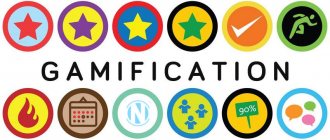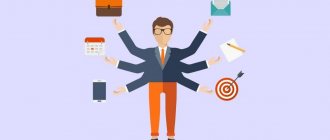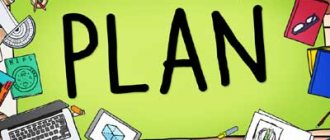In search of an easy way, our brain constantly strives to switch us from a productive mode to something less important: and now, it seems, you are ready to do anything but work tasks. Thus, many become addicted to the drug of “urgency”, when they can only work effectively in the mode of pressing deadlines. But trying to do everything in a short time has an adverse effect on the psyche and becomes a source of endless stress. I will tell you in this article how to focus on one thing, learn to concentrate on work and not be distracted.
Minimizing the number of tasks running simultaneously
Scientists at the University of Michigan have found that multitasking reduces a person's efficiency and makes him work slower.
Employees of the research Vanderbilt University confirm the statement of their colleagues - according to them, the human brain can work efficiently, performing no more than two tasks at the same time. Thus, to focus on business, writes Business Insider, you should reduce the number of tasks - and stop at just one or two.
Health status
It's no secret that the quality and duration of night's sleep directly affect our attention. However, not many people know that too much sleep is just as harmful as too little sleep. In both cases, we feel overwhelmed and lethargic, and concentration is out of the question. Each person needs a different number of hours for proper sleep. In general, it should be at least seven hours. Try to monitor your condition, and once you determine what sleep duration is ideal for you personally, stick to it on a regular basis.
Nutrition also plays an important role. You've probably noticed how difficult it is to concentrate when we overeat or, on the contrary, feel hungry. Both have a negative impact on the health of the body, which, in turn, has a detrimental effect on the brain. Not only attention begins to suffer, but also memory. Try to diversify your diet as much as possible, consuming enough protein, fiber, and carbohydrates every day. Don't avoid sweets, but reduce your consumption if possible.
And finally, stress. It exhausts all body systems and disrupts their functioning, which also affects sleep and appetite, creating a vicious circle. Chronic stress can lead to much more serious problems, including mental problems. How to concentrate in this case? It is very important not to put off solving your problems and work through them as they arise. Remember that asking for help is not a sign of weakness. It just means that you are a living person.
Choosing a place where it is easiest to concentrate
Another conclusion that the researchers came to is that frequent job changes, the need to choose a new place, as well as solving related problems reduce the worker’s concentration.
It will be much more effective to choose in advance a place in which it is easy to concentrate, solve all technical issues (such as the position of the lamp or the arrangement of papers on the table) and work without changing it. Resolving any additional issues will take away the employee’s energy and impair his concentration.
How to Focus on a Goal: Tips for Planning and Concentrating
Another technique is related to mastering time management.
Find the best time
Find out what part of the day you are most productive and complete your most important tasks during that time frame. If you are a night owl, you should not start the day with the most difficult tasks, give yourself time to get the hang of the little things. If you are a morning person, do not put off work issues until the evening.
Psychologist Daria Milai
Make an appointment
Make a plan in the morning
A clear schedule will allow you to track the completion of current tasks and not be distracted by trifles. Give each task you need to complete a strict time frame (with a little margin in case you need more time). Make sure that you are not thinking about two things at the same time, but are focused on only one.
Focus on both short-term and long-term goals
The focus should always be not only on the current activity, but also on thoughts about why you are doing it. Find a way to remind yourself of the goal you are truly striving for. Understanding that your current activity is one of the steps towards your dream will motivate and restore concentration.
How to learn to concentrate on one thing and not be distracted by extraneous thoughts: create a habit
If you are unable to work due to monotony, understand how long your brain can focus on one activity. Based on this, plan your day so that different activity options alternate with each other. For example, take a 10-minute break every half hour. Make a list of small tasks that you can focus on during pauses. Once this format becomes familiar to you, you will notice how much you can get done in a short period of time.
Rest according to your schedule
Rest is extremely important, but only if it is consciously planned by you. Resist the temptation to drink a cup of tea immediately after opening a work document. Agree to take a five-minute break after completing a small, specific task. You can also use the 50/10 or 40/10 technique - then every 40-50 minutes you can relax and consciously distract yourself, and then return to activity again.
Relaxation without distractions
Spending time doing nothing, writes Business Insider, is more useful than relaxing, spending time on a smartphone or on social networks - this has been proven by psychiatrists.
However, scientists from Harvard refute this thesis: in their opinion, it is not true for everyone. Most people of any age are uncomfortable being alone with their thoughts for even 15 minutes. Research involving respondents aged 18 to 77 years has shown that spending about 15 minutes in silence without gadgets makes it more difficult for a person to concentrate on further tasks.
How to Practice Active Concentration
This technique consists of four useful techniques.
Take notes
If the work format allows it, write by hand. This is one of the most effective methods that allows you to constantly keep your brain in good shape and be as involved in the process as possible. As soon as you start to feel distracted during a business meeting or lecture, take more notes. They may not be useful, but they will help you maintain your focus.
Scribble
Drawings in the margins really help you concentrate. If you have to listen to a large amount of information for a long time, by drawing even the simplest elements, you will not allow yourself to get bored and be distracted by extraneous thoughts, you will feel here and now.
How to Become More Focused: Speak Out Loud
Voicing allows you to better understand what you read or write down. Verbalization promotes maximum involvement in activity, because by concentrating on pronouncing a sentence, the brain does not wander, but keeps one task in focus.
Look for the right solutions
When thoughts start to take you in another direction, consciously bring them back to work, telling yourself “I’m doing everything right.” At this moment, start reading, writing or listening even more actively, think about every phrase, feel your actions.
Case 1: Schedule time to focus
Last year, Emily Lin, vice president of a financial services company, was overwhelmed with her workload. She was expanding her private coaching practice and at the same time received a promotion at work. As her responsibilities grew, she was faced with an avalanche of new distractions. “I started getting a lot more emails, messages and calls. And people started coming to my office more often,” she says.
Emily found it difficult to do her job. “I was constantly getting notifications about a new message or email, and even if I only had a few seconds to read it or send a quick reply, it was still distracting,” she says. Accordingly, her mood also changed: “Some messages just made me angry. I often began to lose patience when communicating with colleagues.”
Might be interesting
Inattentional blindness. How focusing on one task prevents us from making decisions
Meditation for dummies: how to start, what to do - and why not everyone needs it
She already knew to set limits on social media by scheduling breaks in advance. “I have defined “windows” for myself when I can log into Facebook. Say, during a ten-minute break between meetings or while I'm waiting for the elevator on the way to lunch. Once I introduced these short breaks, it became much easier for me to control the urge to check social media while working,” she shares.
Emily used the same method to stay focused on work: setting aside time to read messages, but only after completing the most important tasks of the day: “At the beginning of each week, I asked myself what the main tasks needed to be completed. And every day I asked myself what the most important thing I had to do today.”
She says it helped her figure out how much time she needed to focus on work, and then broke it down into periods: “For two hours, I log out of email, put “do not disturb” on Messenger, and turn on voicemail on my phone.” She even puts on headphones so that those who want to stop by her office can immediately see that she is busy.
Two hours is enough to immerse yourself in work and not too much to get tired. After a two-hour period, Emily answers the missed calls and email backlog. Such “response” pauses add an element of urgency to the work: “I even produce adrenaline, so I’m in a hurry to finish all my work in the allotted period of time,” she admits.
Emily believes this approach worked: “It has had a noticeable impact on my productivity.” And she feels less stress: “Since I stopped checking email every minute, my blood pressure has normalized. I now react much more calmly when I am taken away from work.”
She also says that good sleep helps her focus. A few years ago she slept only three to four hours a night, but now she has radically changed her schedule and sleeps six and a half or even seven hours.
“I used to feel like I was choking and I couldn’t concentrate on my work, but now I can think clearly,” she says. “When I get a good rest, it’s easier for me to find new opportunities and be creative.” I know I don't have to respond to email right away." She promotes healthy sleep habits to her coaching clients.
Set boundaries
Once you figure out exactly what distracts you, set rules for yourself. If you know that watching the news upsets you and makes it difficult to concentrate when you arrive at the office, do not look at the news right in the morning; world events may well wait until at least lunch. Or decide that you will do a certain amount of work first and then go to Facebook.
If you lack willpower, there are browser and smartphone apps that monitor how much time you spend on specific sites. But you still can’t do it without practice.
“Numerous studies show that the difference between attention and inattention is being intentional,” says Fernandez.
He gives the example of athletes who follow certain rules during training: “I will not leave the foul line until I have made ten shots.” So train your brain, teach it to concentrate.
Come up with your own rules and restrictions
When considering how to focus on school, work, or creativity, it's important to be aware of what distracts you. Social networks, instant messengers, offers from colleagues to take a tea break or just chat with them for a minute or two - all this is great, but only during a really necessary break, which you will talk about later. Appreciate your work and respect your own capabilities. For example, schedule a specific time to check social media and stick to it. If possible, purchase a second phone that will be exclusively for work calls and correspondence.
We adopt experience
— Watch how other people concentrate . Look at a person who is captivated by an interesting film or book. All their receptors are aimed at perceiving what is happening. Try to copy their behavior.
- Decide what, or who, you want to focus on . Have you noticed how when people become close, they communicate a lot with each other, they become similar? They adopt each other's phrases, behavior patterns and habits. When you pay attention to something and concentrate on it, we adopt some properties of this object.
- Surround yourself with well-organized people . (This follows from the previous point) If you want to learn concentration, be with those people who know how to do it.
— What we train trains . If you decide to train concentration, just do it, study it, try different exercises and techniques. What we pay attention to will definitely improve and train.
Reward yourself
When it comes to focusing on work, school, or creativity, there is one very important point that should not be overlooked. The reward system really makes a huge difference. The thing is that by positively reinforcing our own achievements, we only increase their number in the future, not to mention the fact that this makes it much easier for us to achieve our goals. What’s important is that you should reward yourself even for what you think are the most insignificant victories.
For example, you can reward yourself for each completed item in the plan that we talked about. It could be something small but pleasant: from basic verbal praise to a small purchase. Therefore, when you achieve the goal itself, the reward should be more tangible. Here you can already treat yourself to some good thing, for example, clothes, a delicious dinner at a restaurant, and even a trip to another city or country. This way your brain remembers that any achievement, even a small one, is followed by something very pleasant for you. In the future, it will be easier for you to concentrate on the tasks at hand and, therefore, easier to complete them.
Learning to concentrate
The ability to concentrate is not given to us from birth (which is a pity). Focusing must be practiced, trained like a muscle every day, because there is no magic pill that gives instant results.
The most important thing is not to worry too much about failure. They should serve as lessons from which you draw conclusions. If we constantly get upset and blame ourselves for being weak-willed, it will be even worse. You should treat your mistakes with calmness and composure - it won’t work now, but after a while it will definitely work. The main thing is not to give up!
Understand the dangers of multitasking
First, you need to understand what effect the constant buzzing of your phone, short breaks from Twitter, and other distractions have on your brain. Fernandez explains: There is a whole network of areas in the brain associated with concentration.
There is a passive operating mode network - it is responsible for analyzing the past, forecasts and plans, self-knowledge and understanding of others. “We spend at least half of the day in this mode,” says the scientist.
But when you need to focus, the active mode network turns on, which allows you to put aside extraneous thoughts and focus on the task.
Distractions in any form pull you back into a passive mode, and it takes a lot of cognitive effort to refocus on the task. “Some studies show that it takes 10 to 18 minutes to return to your original level of attention,” says Fernandez. This is why it is so important to reduce distractions to a minimum.
Take care of your health
No matter how great things we are capable of, we are only human. Like any living organism, it is extremely important for us to maintain our health. Sleep enough hours, make sure your meals are nutritious and regular, and include at least minimal physical activity (exercise, aerobics) in your life. Try to avoid overwork, as it can have more serious consequences than we used to think. Overwork can lead to emotional burnout, an increased risk of colds, and simply chronic stress. Take care of yourself.
Moreover, we should not forget about the importance of psychological health. Set yourself only realistic, feasible goals and objectives. Maintain an active social life, because communication with family, friends, buddies and good colleagues is very beneficial for our psyche. And of course, try to solve problems that concern you - both work and personal - as soon as they arise. Or in the near future.
Exercises to develop attention
- Take a close look at your office or room at home. Choose one subject and turn your full attention to it. You need to look at it for a couple of minutes. For example, a flower in a pot. Without touching it, you need to try to understand what kind of surface the pot has (smooth, ribbed, rough), what colors and shapes the leaves of the flower have, how the shadow falls. By doing this simple exercise every day, you can gradually learn to concentrate on more important things.
- You can use the children's game "Find the Differences". Find special pictures with several differences. The more there are, the better. Compare two images and find different details that are different. This exercise is great for developing attention to detail.
- A fairy tale can also be an excellent exercise for developing concentration. You can do the exercise with your children or simply by mentally composing a fairy tale involving surrounding objects. It's quite fun and helps keep your attention longer.
Medications
You can increase concentration and improve the general condition of the body with the help of a number of medications:
- Glycine. Relieves stress, calms, increases brain performance and attention.
- Vitrum memory. Medicine based on herbal ingredients. Enhances alertness, normalizes blood circulation and, as a result, brain nutrition.
- Undevit. Vitamins A, B, C, E, P. Has a general strengthening effect.
- Aminalon. Helps remove toxins accumulated in the body and restore the functioning of the nervous system, thereby improving performance and concentration.
- Bilobil. Improves sleep and mental activity, eliminates anxiety.
- Intellan. Helps cope with depression and eliminates forgetfulness.
- Ginkgo biloba. Improves memory and the ability to maintain attention, eliminates insomnia and dizziness.
The listed drugs have virtually no contraindications or side effects. However, it is recommended to consult a doctor before using them.











